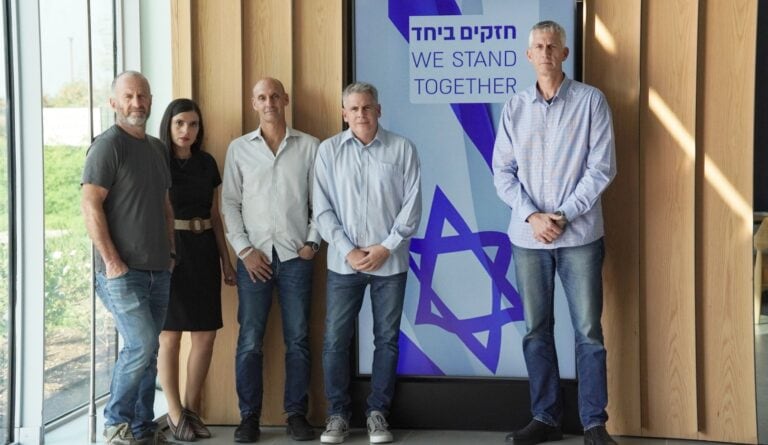Israeli precision agriculture company Greeneye was thriving before October 7.
The company developed an AI-enabled spraying system that reduces herbicide use by up to 94% and was set to close an investment round in support of launching strategic partnerships in the United States for the 2024 growing season.
“Two days after the war started, they were informed that a major new investor was pulling out. This caught them at a critical phase and the entire round collapsed,” says Gil Friedlander, cofounder of Iron Nation, a volunteer-led emergency impact fund.
“This amazing company could have gone bust because of the force majeure of a war. And the three Greeneye cofounders were in the reserves, trying to save the country while trying to save their startup as well.”
Iron Nation stepped in with a commitment of $750,000. In addition, says Friedlander, “we verified that the existing investors will invest as well and bring some fresh money in. With our support and network, it could end up being a $4 million or $5 million round that will enable GreenEye to continue and flourish.”
Founded in the wake of the October 7 Hamas massacres and kidnappings in Israel, Iron Nation has already raised more than half of its stated $20 million goal to support 30 seed- and A-round Israeli tech startups negatively affected by the war.
Following a fundraising road show for Iron Nation in North American Jewish communities, Friedlander told ISRAEL21c on February 11 that “we passed $12 million of investment in the fund and have made already four investments in great Israeli startups impacted by the war.”
He says the rapid response of donors, investors and partners to Iron Nation’s call reflects an understanding “that if we do not ensure the continuity of Israel’s most promising startups during these challenging times, we are sacrificing the leaders of tomorrow’s tech ecosystem. We are here to ensure they can sustain and grow during these difficult circumstances.”
The high-tech sector, he notes, represents 18 percent of Israel’s GDP.
Time to give back
After 20 years in the Israeli air force and 25 years in Israeli high-tech sector, including 16 as CEO and cofounder of several successful companies, Friedlander joined with special-forces veteran Chen Linchevski to establish Calyx Ventures. They aim to build new climate-tech companies in collaboration with academics and entrepreneurs.
“That was our reality until October 7,” Friedlander tells ISRAEL21c.
“Since then, I prepared food for soldiers and drove my wife, a psychologist, to give mental health support. But I didn’t feel I was moving the needle enough.”
He and Linchevski saw many high-tech entrepreneurs mobilized to Gaza and struggling to keep their companies afloat as investors withdrew term sheets.
“It was time for me to give back,” says Friedlander.
“We put the rest of our lives, and Calyx, on hold and devote our full time to Iron Nation along with our third cofounder, Jason Wolf, who was in Chen’s special-forces unit. We’re too old to fight, so this is our miluim [reserve duty].”
Very quickly, they recruited volunteers from the high-tech sector, initially in Israel and later in the United States too, on a fully voluntary basis to create a vehicle that would be attractive for investors. The government’s Israel Innovation Authority pledged a $100 million matching fund.

Iron Nation – named in solidarity with the Iron Swords war — charges no management fees or carried interest. “All money raised goes to the startups and all the upsides go back to the investors.”
700 applicants
Friedlander says about 700 companies applied for funding from Iron Nation, indicating a good product-market fit.
“High-tech in general has gone through challenging times in recent years with increased interest rates and Israel went through a challenging nine months of political upheaval,” he points out.
“A lot of companies were planning after the high holidays [which ended on October 7] to move ahead with investment rounds — and then the war erupted. Unfortunately, about half those 700 companies that applied did not meet Iron Nation’s initial investment criteria, but the other half presents a good opportunity.”
Due diligence and investment decisions are carried out by a team of volunteers including VC stars such as Chemi Peres of Pitango, Charlie Federman of SilverTech Ventures, Danny Cohen of Viola Ventures, Aaron Applbaum of MizMaa, Calanit Valfer of the Elah Fund, and Moshe Lichtman of IGP Capital.
“It is heartbreaking to see founders who hit incredible growth in the first two quarters of 2023 and had term sheets for significant rounds, now struggling to have runway through 2024,” said Federman. “As a tech ecosystem and community, we cannot let them become another casualty in this war.”
A volunteer staff of 10 works to process the applications and distribute funds to those chosen by the committee as quickly as possible. Various service providers and nonprofits are donating their time and talent pro bono to Iron Nation as well.
Greeneye and Nurami
Greeneye is one of the first two startups selected for their growth trajectory and potential to thrive despite the challenging current situation.
The second is Nurami Medical of Haifa, which recently received FDA clearance for its nanotechnology-based patch designed to enhance healing after neurosurgery. One of its cofounders is a female Arab Israeli.
“We really liked their product and team,” says Friedlander. “They were about to go for a new funding round, but in the current environment they wouldn’t be able to close the round without Iron Nation.”
Friedlander spoke to ISRAEL21c during a trip to North America to recruit additional support for Iron Nation by speaking to professional groups and Jewish foundations and federations.
“I’ve raised a lot of money in my life, but I never worked with Jewish institutional money,” he says. “I’ve learned that these groups are very generous with philanthropic support to Israel but they never direct money from their endowment to Israel. Rather, they invest it in the US stock markets and US venture capital funds.
“I am on a crusade to try to persuade them to take 1% of their endowment, which is billions of dollars, and invest it in the Israeli high-tech sector, which I’m confident in the long run will provide very nice returns. It’s a good financial decision but also connecting to their purpose of supporting Israel and it could change the economy here.”
Iron Nation is compliant with the requirements of US Securities Act Rule 506(c) and is open to US accredited investors. It’s also a 501(c)(3) organization and all donations are tax-deductible.
For more information, click here.

















